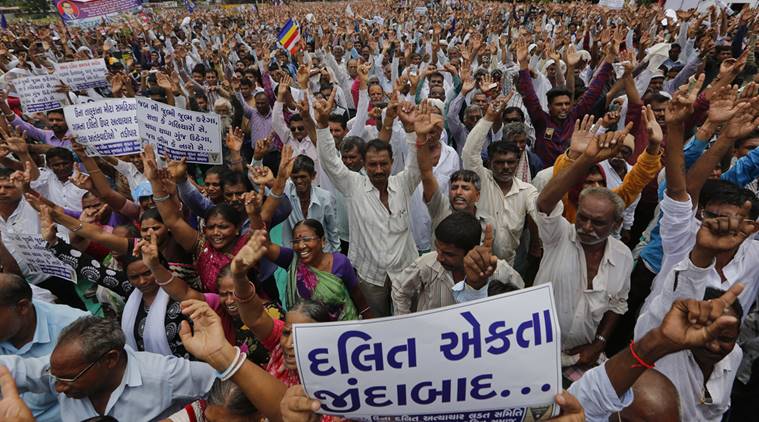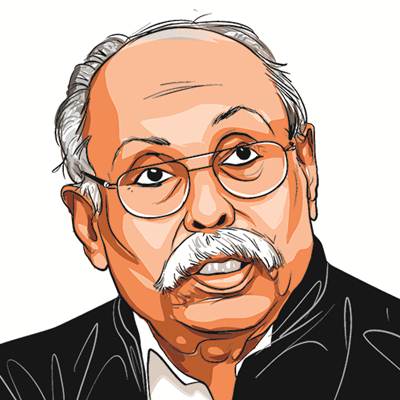Opinion Una awakening
In the aftermath of Gujarat atrocity, a new focus on land distribution for redemption of Dalit dignity.

 In Una, of the 57 Dalit families, only three have got a patch of land. All of them are agricultural wage-labourers and a few of them also have the occupation of skinning of carcasses of dead animals. (AP Photo)
In Una, of the 57 Dalit families, only three have got a patch of land. All of them are agricultural wage-labourers and a few of them also have the occupation of skinning of carcasses of dead animals. (AP Photo)
The atrocity on the Dalits of Una has had far-reaching consequences, which are still unfolding. Its wide dissemination through social media by arrogant criminals to exhibit their “prowess” has helped wake up the Dalits in Gujarat to the issues plaguing them. This has made them mobilise spontaneously in an unprecedented manner. There have been several instances of massacres and other atrocities on Dalits and Adivasis in the past. But none of them secured the same attention, nor led to state-wide mass mobilisation as now.
The awakened Dalits are not only seeking justice for the Una victims. In the Dalit mahasammelan in Ahmedabad on July 31, they have asked the government to account for the Thangadh atrocity where three Dalits were killed in 2012. Soon they will ask governments and political parties and Central and state governance organisations to account for numerous other atrocities of the past, especially post-Independence. They have seen the link between other issues of Dalits that successive Central and state governments and political parties and their leaders have consistently ignored. They have demanded legislation for the special component plan for Scheduled Castes (SCP) and the tribal sub-plan (TsP) and proper utilisation of SCP and TsP funds. They have understood the centrality of landlessness as a basic cause of vulnerability of the Dalits, lying at the root of “untouchability” and atrocities and their deprivation in every sector of development, welfare and life, and the centrality of land-ownership for redemption of Dalit dignity.
For instance, in Una, of the 57 Dalit families, only three have got a patch of land. All of them are agricultural wage-labourers and a few of them also have the occupation of skinning of carcasses of dead animals — imposed on them by the caste system and “untouchability”. The Una Dalits have demanded land so that they can lead a life of dignity. Successive governments have ignored the issue of land-distribution to all Dalits. A governors’ committee, set up by India’s only Dalit president, K.R. Narayanan, has reported that there is enough government land for distribution to every landless rural SC family. This was among the issues I discussed with Manmohan Singh on May 8, 2004 a few days before the Parliament election results. As a result of my efforts, the UPA’s CMP included distribution of land to every rural SC and ST family and minor irrigation for the land of SCs and STs. These became national commitments when the president included them in his address to Parliament’s joint session in 2004. But the UPA government did not lift even a finger to implement these and other commitments to the Dalits.
After the elevation of Manmohan Singh to prime-ministership, I reminded him of these two commitments. In a mournful voice, he intoned, “Mr Krishnan, these are state subjects”. I told him that advancement of SCs and STs is the joint responsibility of the Centre and states and accordingly the Central government had taken initiatives in the past, like introducing the SCP and TsP and other measures. I also told him that Central initiative, backed by financial support, will help ensure that states do undertake these programmes vital for Dalit survival and progress and their freedom from “untouchability”, atrocities and other forms of exploitation and deprivation. He was unwilling to proceed further.
I have taken up these issues with Prime Minister Narendra Modi and other leaders of the present government. But in this matter, they have till now followed in the UPA government’s footsteps.
The Dalit mahasammelan has also pointed out the absence of exclusive special courts for the trial of cases of atrocities against SCs and STs. In the SC and ST (Prevention of Atrocities) Act of 1989, certain individuals adopted a subterfuge to avoid exclusive special courts in all districts. This has become mandatory with the SC and ST (Prevention of Atrocities) Amendment Act 2015. Yet, they have not been set up in Gujarat and other states. The sammelan has also demanded enactment of the reservation act. This was a commitment in the UPA’s CMP and the president’s address to the Parliament in 2004. They have demanded a public apology from the Gujarat government for withdrawing a book on Babasaheb Ambedkar. They will soon demand a national apology for the centuries of “untouchability”, imposition of slavery, serfdom and agricultural labourhood, denial of land-ownership and education, imposition of demeaning occupations like manual scavenging, and skinning of carcasses.
This fire will not be extinguished. It will spread into a nation-wide mass mobilisation and peaceful and powerful agitation. Once the Dalits mobilise on this scale, other deprived groups like the STs, the most and extremely backward castes of socially and educationally backward classes (SEBCs) will also join them.
The mahasammelan noted the absence of the chief minister’s visit to a single Dalit victim of atrocities in the period from 2001 to 2014. This is true of all prime ministers and chief ministers of this country. Indira Gandhi went to Belchi when she was not the prime minister. Janardhan Reddy of Andhra Pradesh who went to Tsunduru in 1991 is a rare chief minister I remember as having visited the site of an atrocity. But when I met him and suggested simple measures for preventing such atrocities, he brushed them aside, observing “it is not possible to satisfy Mr Krishnan.”
The present mobilisation and the mahasammelan are a wake-up call for the Central and state governments and ruling parties and all other parties and leaders of the country and India’s elite, mostly belonging to upper castes who occupy the commanding heights of Indian governance and institutions at all levels. They must remember that they can ignore land distribution, atrocities, and other Dalit issues, only at their own peril, at the peril of their parties and at the cost of the nation and its progress. I earnestly beseech and advise them to resolve these issues holistically on top priority.




